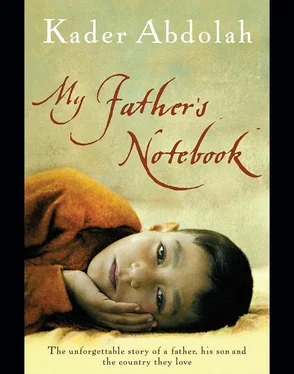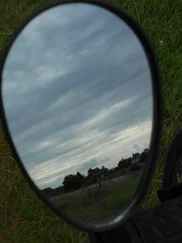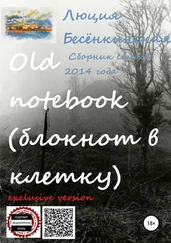“Yes, but I’m making up for lost time.”
“What lost time?”
“All those months and years of training in the mountains with my comrades so we could conquer a city.”
“Oh, everyone’s lost that kind of time. It isn’t really lost. Ultimately it all adds up to life’s experience.”
“The sea!” he suddenly exclaimed. “Can you see it?”
I couldn’t make it out in the dark. It was still Louis’s sea, not mine.
I held on to him and let him stare at the sea in silence. I noticed that he could no longer stand without assistance.
“Four more dunes to go!” Louis said. “We’ll get there!”
The grass was wet and I was afraid he’d slip. I was so busy concentrating on where to put my feet that I didn’t hear the sea. When we came to the last dune, he said, “My legs are numb.”
“Maybe we should sit down and rest for a while,” I said.
We sat for fifteen minutes. Then I helped him get up again.
“This time we’re going to make it,” said Louis.
We set off.
The sea was still new to me, unlike the desert.
Louis felt at home on wet sand; I felt at home on dry sand. The sea, the dunes, the grass, and the rain belonged to him, but the night belonged to me.
“When I’ve finished my book,” I said to Louis, “I will no longer be living for my father, but for myself.”
Just then I heard a woman’s voice, shouting from the darkness behind the dunes: “Daddy, D-a-a-a-d-dy!”
“Over here,” Louis called excitedly.
The silhouette of a young woman in a hat suddenly appeared on the moonlit top of the last dune.
“Daddy, how on earth did you get here?”
I looked at her. She grabbed her hat to keep the wind from blowing it away. The rain beat down on her.
She knelt by her father.
I heard her crying, then Louis pointed at me. She stood up.
There was another gust of wind. She grabbed her hat again and looked out towards the sea, to the place where I was standing.
The story brings us to Jamileh.
Jamileh needs a hiding place.

One of the most important orders the party gave me was to provide a hiding place for Jamileh.
It was a huge responsibility. If I bungled the job, I’d never be able to redeem myself. If I couldn’t guarantee Jamileh’s safety, it would be a disaster, not only for the party but for my family as well.
Jamileh — the legendary resistance fighter whose heroic deeds were known to one and all — was more precious than gold. Her fate was in my hands. I would have to hide her so well that the shah’s secret police would never find her.
No one ever thought the party could get her out of Ewin Prison, the shah’s most notorious jail. To this day no one knows how she escaped from that hellhole. It’s believed that she had help from an officer who had secret contacts with the party.
Before her arrest, Jamileh had been in a shoot-out. Seven leading members of the party had been killed, but Jamileh went on fighting. All of Tehran held its breath. She kept dozens of policemen at bay, until she ran out of ammunition. Then she swallowed a suicide pill. The secret police were determined to take her alive. They immediately pumped her stomach and flew her by helicopter to a military hospital.
At the same time, the shah was appearing on TV almost every night with a big smile on his face. He swore up and down in interviews that his secret police had wiped out the leftist movement once and for all. No party member or party sympathiser dared to make a move.
But now Jamileh had escaped. By liberating her from prison, the party had demonstrated that it was alive and well, and stronger than ever.
I was informed that I had an appointment with Homayun. (By the way, he was arrested after the revolution and executed on the personal orders of Khomeini.)
Homayun met me in the basement of a glass factory. He told me that Jamileh had been liberated from Ewin. Despite this earthshaking news, he spoke calmly, as if it were an everyday event, and that helped me rein in my excitement. “This is strictly confidential,” he said. “No one else must know. The operation has been successful so far, but it’s not over. We haven’t issued an announcement yet and the police haven’t said anything about the escape, either. We’re planning to smuggle Jamileh across the border, but we need to hide her in a safe place for at least a week until we’ve made the arrangements. What about your father’s shop?”
I could feel the tension in my neck and shoulders. This was a turning point in my life. The movement needed my help. I was being given a chance to determine the outcome of a singular episode in the history of the resistance. I knew the escape had been shrouded in mystery. I knew it was a fairy tale that would be handed down to later generations. I wanted that fairy tale to be told. But if anything went wrong, if the secret police dragged her out of my father’s shop, it would be the end — for her, for me and for my father.
Fairy tales are not subject to the same laws as normal life. I had to think fast, give an immediate reply and instantly go into action.
“All right,” I said. “I’ll make the arrangements.”
At nine o’clock that evening, I parked my car in a deserted garage outside of Tehran, on the road to Isfahan. I slipped behind the wheel of a red van that had been waiting for me and drove off.
My heart was pounding in my ears. For a moment, I couldn’t concentrate. I’d never been so scared in my life. Then a truck honked and I snapped out of my daze, regained my self-control and realised that I was driving a van and that Jamileh was hiding in the back, lying beneath a couple of rolled-up carpets.
Jamileh was a pseudonym. Nobody knew what she looked like. During the revolution, Jamileh published her autobiography, in which she revealed that she’d been tortured and raped in prison. Her jailers had hoped to break her will, to make her betray her comrades. But time after time she’d shouted, “Down with the shah!”
Ten minutes ago she’d been a character in a fairy tale. Now I could see her in my rear-view mirror and talk to her.
“Hello, comrade,” I called softly, looking in the mirror. There was no reply.
“Comrade! Are you all right?” I said a bit louder.
No answer. I thought she’d fallen asleep, so I drove on in silence.
My father and I had an agreement. He was supposed to stay in his shop until midnight. When the clock struck twelve, he could turn out the light and go home.
The stores were usually open until nine, but my father liked to stay in his shop until late at night. Everyone thought it was perfectly normal. He had a storeroom, a kind of lean-to at the back of his shop, where Jamileh would be safe. It had a window that looked out over the river and the mountains. In an emergency, she could escape through the window.
“Comrade! Can you hear me?” I called again. In my mirror I saw something move beneath the carpets, but there was no sound.
I reached Senejan at a quarter to twelve. At five to twelve I saw that the light was still on in the window of my father’s shop. I parked the car, switched off the lights and whispered, “We’re here. Stay where you are, I’ll be back in a few minutes.”
I walked to the shop. My father had fallen asleep beside his stove. I gently touched his shoulder. He woke with a start and immediately sat up.
“Don’t get up,” I quickly signed. “I have something important, very important, to tell you. I have someone with me. A young woman. We have to give her a place to stay, for a week maybe, or even ten days. Listen carefully: no one must know she’s here. If the police find out, s he’ll be arrested, and if she’s arrested, s he’ll be killed. Do you understand?”
Читать дальше













